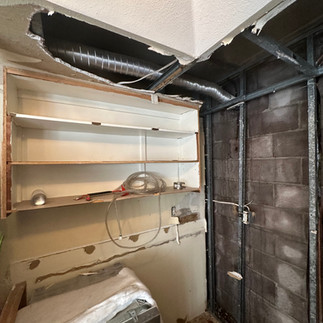Dishwashers are a constant source of water emergencies. We had a homeowner in Biltmore have an issue with a clogged drain in their dishwasher but since it was a multifamily property the single leak can have significant effects on neighboring units, leading to costly repairs and health hazards. In this post, we’ll explore the importance of responding swiftly to water damage in condos and share insights based on a recent job experience.
The Ripple Effect of Water Damage
In a multi-story building, water doesn’t stop where it begins. A leaky pipe, while seemingly minor, can cause water to flood into the units below. For example, a small leak from a third-floor bathtub can not only damage the bathroom but can also lead to water pooling in the kitchen of the second floor, and possibly impact the living room of the first floor. A report from the Insurance Information Institute suggests that water damage accounts for nearly 25% of all homeowners insurance claims, emphasizing how prevalent such issues are.
The key takeaway? Whether you're a tenant or landlord, monitoring water sources in your condo is essential. Regular inspections can help catch potential problems before they escalate into major disasters.
Signs You Might Need Help
So, how can you tell when it's time to call in the professionals? Here are some signs to watch for in your condo:
Visible Water Spots: Look for discoloration or warping on ceilings and walls; these can signal a leak.
Unexplained Dampness: Is there an area that feels persistently wet, especially on floors or around appliances? This could be a troubling sign!
Mold Growth: If you notice mold—even in small amounts—address it promptly. Mold can grow rapidly and poses serious health risks, especially for those with respiratory issues.
Quickly addressing these warnings can save you from bigger, more expensive headaches later on.
(re)Biltmore Dry-Out
We sprung into action to resolve the leak as soon as possible. The leak caused damage to adjacent units and we also serviced them as well.
Preventive Measures to Consider
Even though you can’t control everything in a condo, there are effective preventive measures you can take to keep your unit dry:
Regular Inspections: Routinely check your plumbing and appliances for leaks. Don't ignore even minor issues; they can lead to major problems down the line.
Sealant Applications: Using water-resistant sealants in areas prone to moisture—like around sinks and bathtubs—can significantly reduce the risk of leaks.
By being proactive and informed, you can help protect your home and those around you.
A Smart Approach to Water Issues
Facing water problems in a multi-story condo is challenging. Recognizing the signs and seeking professional help can make a world of difference. Remember, when water is involved, prevention is vital—addressing issues early is far easier (and cheaper) than dealing with the aftermath of extensive damage.
By staying vigilant and informed, condo residents can safeguard their homes and the well-being of their neighbors. When it comes to water, being proactive beats reactive every time. Keep those eyes peeled; it's always better to be cautious than to face a soggy situation!


















Comments